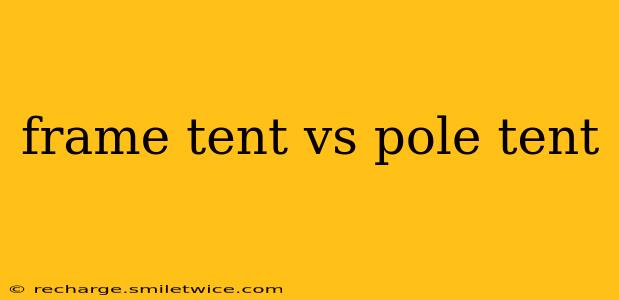Choosing between a frame tent and a pole tent can be a daunting task, especially with so many options available. Both offer shelter from the elements, but their designs, setup, and suitability for different occasions vary significantly. This comprehensive guide will break down the key differences, helping you decide which type of tent best fits your needs.
What is a Frame Tent?
Frame tents, also known as arched tents or structure tents, boast a sturdy, self-supporting aluminum or steel frame. This frame provides the tent's structure, eliminating the need for center poles. The fabric cover simply drapes over this pre-built framework.
Advantages of Frame Tents:
- Easy Setup: Generally easier and faster to erect than pole tents, particularly for larger sizes. They often require fewer people for assembly.
- Stable Structure: The rigid frame offers superior stability in windy conditions.
- More Versatile: Frame tents are available in a wider array of sizes, shapes (including peak and gable styles), and configurations. They can often be combined to create larger event spaces.
- Sleek Appearance: Their clean lines and lack of visible poles create a more polished and professional look, often preferred for weddings, corporate events, and upscale gatherings.
Disadvantages of Frame Tents:
- Higher Cost: Frame tents are typically more expensive than comparable-sized pole tents.
- Heavier: The robust frame makes frame tents heavier and more difficult to transport.
- Limited Customization: While styles vary, the customization options are usually less extensive than with pole tents.
What is a Pole Tent?
Pole tents, also called center-pole tents or traditional tents, rely on a central pole and often additional support poles to create their structure. The fabric cover is draped over and secured to these poles.
Advantages of Pole Tent:
- Lower Cost: Pole tents are generally more affordable than frame tents, particularly for large events.
- Lighter Weight: Typically easier to transport and set up than frame tents, especially smaller models.
- Greater Customization: They offer more potential for customization, allowing for greater control over the tent's overall design and appearance.
Disadvantages of Pole Tent:
- More Difficult Setup: Requiring more steps and often more manpower for assembly.
- Less Stable in Wind: More susceptible to damage in strong winds due to their reliance on poles rather than a rigid frame.
- Cluttered Appearance: The central poles and supporting structures can create a less visually appealing setup compared to frame tents.
Frame Tent vs. Pole Tent: Key Differences Summarized
| Feature | Frame Tent | Pole Tent |
|---|---|---|
| Structure | Self-supporting frame | Center pole and supporting poles |
| Setup | Easier and faster | More complex and time-consuming |
| Stability | More stable in wind | Less stable in wind |
| Cost | More expensive | Less expensive |
| Weight | Heavier | Lighter |
| Appearance | Sleeker and more professional | More traditional, potentially cluttered |
| Customization | Less extensive | More extensive |
What Size Tent Do I Need?
Determining the appropriate size for your tent is critical. Consider the number of guests, furniture, and necessary space for activities. Accurate headcounts and estimations of required space are crucial for a comfortable and functional event. Many suppliers offer sizing guides and can assist with choosing the best fit.
What is the Best Tent Material?
Tent materials vary greatly in terms of durability, water resistance, and UV protection. Look for reputable brands and materials that suit your needs and budget. Canvas, vinyl, and polyester are common choices, each offering different properties.
How Do I Choose the Right Tent for My Event?
Consider the following factors when making your decision:
- Budget: Frame tents are a premium option, while pole tents offer a more budget-friendly alternative.
- Event Type: Formal events like weddings often favor the sleek appearance of frame tents, while informal gatherings might suit pole tents perfectly.
- Location and Weather: Windy conditions favor the superior stability of frame tents.
- Setup Time and Resources: Frame tents are quicker to set up, but pole tents may be more manageable with limited manpower.
By carefully considering these factors, you can confidently choose between a frame tent and a pole tent, ensuring the perfect shelter for your next event.
